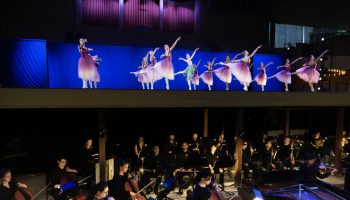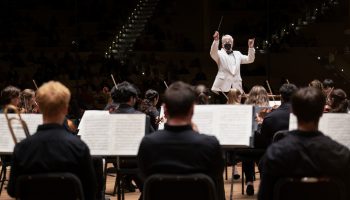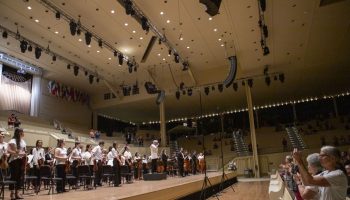For their end-of-season recital, the 10 Music School Festival Orchestra cellists will play pieces that were arranged specifically for them.
Arie Lipsky, chamber music chair, commissioned a cellist from the University of Michigan to arrange famous pieces by Richard Strauss and Johannes Brahms for the cello — pieces that are typically performed by piano, orchestra and voice. The students will perform the pieces at a recital at 4 p.m. Thursday in McKnight Hall.
“Had Strauss and Brahms heard this new version,” Lipsky said, “they would say ‘Oops, how come I didn’t think of it?’ ”
Although audiences may be familiar with the pieces, Lipsky said the rich sound of the cello changes the piece for the listener. Lipsky said the cello is unique because of its range in pitch. The cello can play both low bass lines and high notes, almost in the range of the violin, he said.
The program will conclude with “Bachianas Brasileiras” No. 5, by Heitor Villa-Lobos. The Brazilian composer created these pieces as an homage to Johann Sebastian Bach for different combinations of instruments and voices. Thursday’s piece will feature the cello players and two voice students. The piece has become a tradition for Lipsky, who has ended the cello recital with the piece for each of his 21 years at Chautauqua Institution.
In addition to ensemble pieces, the students also have the chance to perform a solo piece that they’ve been practicing throughout the summer. Lipsky said he’s seen the students in various settings over the summer — private lessons, master classes, cello ensembles and orchestra – and has seen incredible development in all of them.
“For me as an educator, it always fascinates me how they grow,” Lipsky said. “In less than two months … they grow immensely. That’s one of the most fascinating parts, just to see how the young people grow as artists and as human beings.”
In addition to the improved playing over the past seven weeks, Lipsky said he’s seen the cellists become more confident performers and more capable of musical analysis.
He also said it’s remarkable how the cellists have formed a unified group, both on and off the stage.
“In the beginning of the summer we had 10 cellists who had never met each other, never played with each other, never knew about each other,” Lipsky said. “After seven weeks, they are united. There’s new friendships established that are going to last for a long time, in some cases for a lifetime.”




